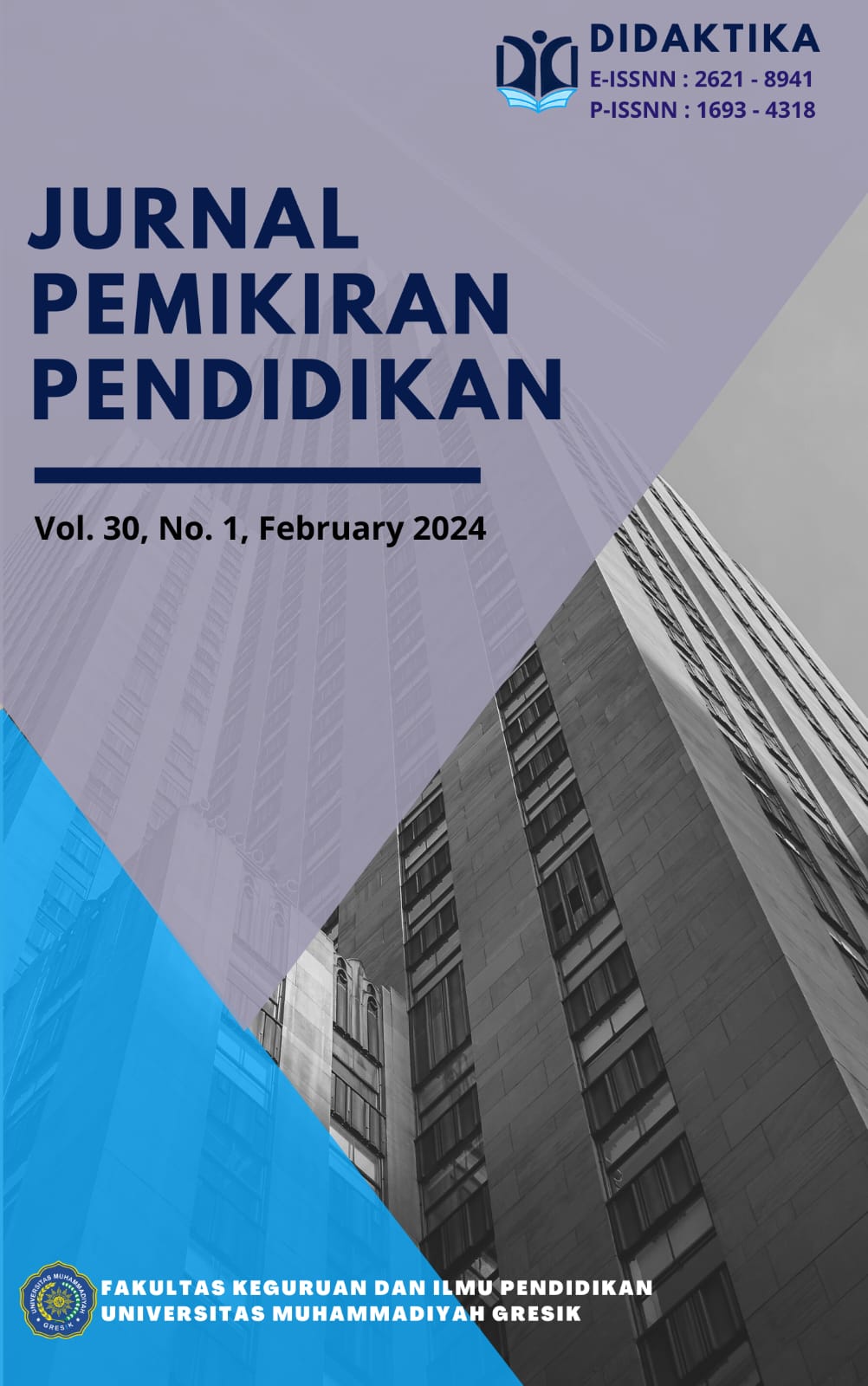Dampak Kebijakan Merdeka Belajar Kampus Merdeka (MBKM) pada Perguruan Tinggi Swasta
DOI:
https://doi.org/10.30587/didaktika.v30i1.7462Keywords:
Policy; private university;Abstract
Merdeka Belajar Kampus Merdeka (MBKM) is an independent and versatile higher education learning program designed to create a non-restrictive creative learning community that meets student needs. This research aims to see the impact and perception of implementing Merdeka Belajar Kampus Merdeka (MBKM) for all students in private universities, especially at the Muhammadiyah University of Gresik, Primary School Teacher Education Study Program with the aim of seeing the extent of students' understanding and perceptions and the impact of implementing the Independent Campus Learning (MBKM) program. This research is descriptive research with a quantitative approach using survey methods. Data was obtained from respondents who were students of the Muhammadiyah Gresik University Primary School Teacher Education Study Program. Data was collected through questionnaires. Data analysis techniques start from data collection and then analyzed using descriptive analysis. The results of this survey research are in the form of answers or responses from students in the elementary school teacher education study program, Faculty of Teacher Training and Education (FKIP) Muhammadiyah University of Gresik to the Merdeka Belajar Kampus Merdeka (MBKM) program.
References
Arikunto, S. (2010). Prosedur Penelitian : Suatu Pendekatan Praktik (Edisi Revisi). Jakarta: Rineka Cipta
Aswita, D. (2021). Merdeka Belajar Kampus Merdeka (MBKM): Inventarisasi Mitra Dalam Pelaksanaan Magang Mahasiswa Fakultas Keguruan Dan Ilmu Pendidikan. Prosiding Seminar Nasional Biotik, 9(1).201-206
Baharuddin, M. R. (2021). Adaptasi Kurikulum Merdeka Belajar Kampus Merdeka (Fokus: Model MBKM Program Studi). Jurnal Studi Guru Dan Pembelajaran, 4(1), 195-205.
Https://Doi.Org/10.30605/Jsgp.4.1.2021.591
Fuadi, T. M. & Aswita, D. (2021). Merdeka Belajar Kampus Merdeka (Mbkm) : Bagaimana Penerapan Dan Kedala Yang Dihadapi Oleh Perguruan Tinggi Swasta Di Aceh. Jurnal Dedikasi Pendidikan, 5(2), 603614
Junaidi, Aris, Dkk. (2020). Panduan Penyusunan Kurikulum Pendidikan Tinggi Di Era Industri 4.0 Untuk Mendukung Merdeka Belajar-Kampus Merdeka. Jakarta: Direktorat Jendral Pendidikan Tinggi Kementrian Pendidikan Dan Kebudayaan
Kamalia, P., & Andriansyah, E. (2021). Independent Learning-Independent Campus (MBKM) In Students’ Perception. Jurnal Kependidikan: Jurnal Hasil Penelitian Dan Kajian Kepustakaan Di Bidang Pendidikan, Pengajaran Dan Pembelajaran, 7(4), 857-867.
Https://Doi.Org/10.33394/Jk.V7i4.4031
Rochana, R. Darajatun, R. M. & Ramdhany, M.A. (2021). Pengaruh Implementasi Kebijakan Kampus Merdeka Terhadap Minat Dan Keterlibatan Mahasiswa. Journal Of Business Management Education 6(3) 11-21.
Https://Doi.Org/10.17509/Jbme.V6i3.40165
Sopiansyah, D., Masruroh, S., Zaqiah, Q., & Erihadiana, M. (2021). Konsep Dan Implementasi Kurikulum MBKM (Merdeka Belajar Kampus Merdeka). Reslaj: Religion Education Social Laa Roiba Journal, 4(1), 34-41.
Https://Doi.Org/10.47467/Reslaj.V4i1.458
Wijiharjono, N. (2021, July 11). Akreditasi Perguruan Tinggi Dan Kebijakan Merdeka Belajar-Kampus Merdeka: Sebuah Pengalaman Dan Harapan.
Https://Doi.Org/10.31235/Osf.Io/F9smv
Zunaidi, A., Naning Fatmawatie, Sri Anugerah Natalina, & Imam Annas Mushlihin. (2021). Penguatan Pemahaman Dan Orientasi Kurikulum Kampus Merdeka Dalam Menyambut Merdeka Belajar-Kampus Merdeka. Batuah: Jurnal Pengabdian Kepada Masyarakat, 1(2), 1-7.
Https://Doi.Org/10.33654/Batuah.V1i2.1361
Downloads
Published
How to Cite
Issue
Section
License
License and Copyright Agreement
In submitting the manuscript to the journal, the authors certify that:
- They are authorized by their co-authors to enter into these arrangements.
- The work described has not been formally published before, except in the form of an abstract or as part of a published lecture, review, thesis, or overlay journal.
- That it is not under consideration for publication elsewhere,
- That its publication has been approved by all the author(s) and by the responsible authorities – tacitly or explicitly – of the institutes where the work has been carried out.
- They secure the right to reproduce any material that has already been published or copyrighted elsewhere.
- They agree to the following license and copyright agreement.
Copyright
Authors who publish with DIDAKTIKA: Jurnal Pemikiran Pendidikan agree to the following terms:
- Authors retain copyright and grant the journal right of first publication with the work simultaneously licensed under a Creative Commons Attribution License (CC BY-SA 4.0) that allows others to share the work with an acknowledgment of the work's authorship and initial publication in this journal.
- Authors are able to enter into separate, additional contractual arrangements for the non-exclusive distribution of the journal's published version of the work (e.g., post it to an institutional repository or publish it in a book), with an acknowledgment of its initial publication in this journal.
- Authors are permitted and encouraged to post their work online (e.g., in institutional repositories or on their website) prior to and during the submission process, as it can lead to productive exchanges, as well as earlier and greater citation of published work.
Licensing for Data Publication
Open Data and Software Publishing and Sharing
The journal strives to maximize the replicability of the research published in it. Authors are thus required to share all data, code or protocols underlying the research reported in their articles. Exceptions are permitted but have to be justified in a written public statement accompanying the article.
Datasets and software should be deposited and permanently archived inappropriate, trusted, general, or domain-specific repositories (please consult http://service.re3data.org and/or software repositories such as GitHub, GitLab, Bioinformatics.org, or equivalent). The associated persistent identifiers (e.g. DOI, or others) of the dataset(s) must be included in the data or software resources section of the article. Reference(s) to datasets and software should also be included in the reference list of the article with DOIs (where available). Where no domain-specific data repository exists, authors should deposit their datasets in a general repository such as ZENODO, Dryad, Dataverse, or others.
Small data may also be published as data files or packages supplementary to a research article, however, the authors should prefer in all cases a deposition in data repositories.











